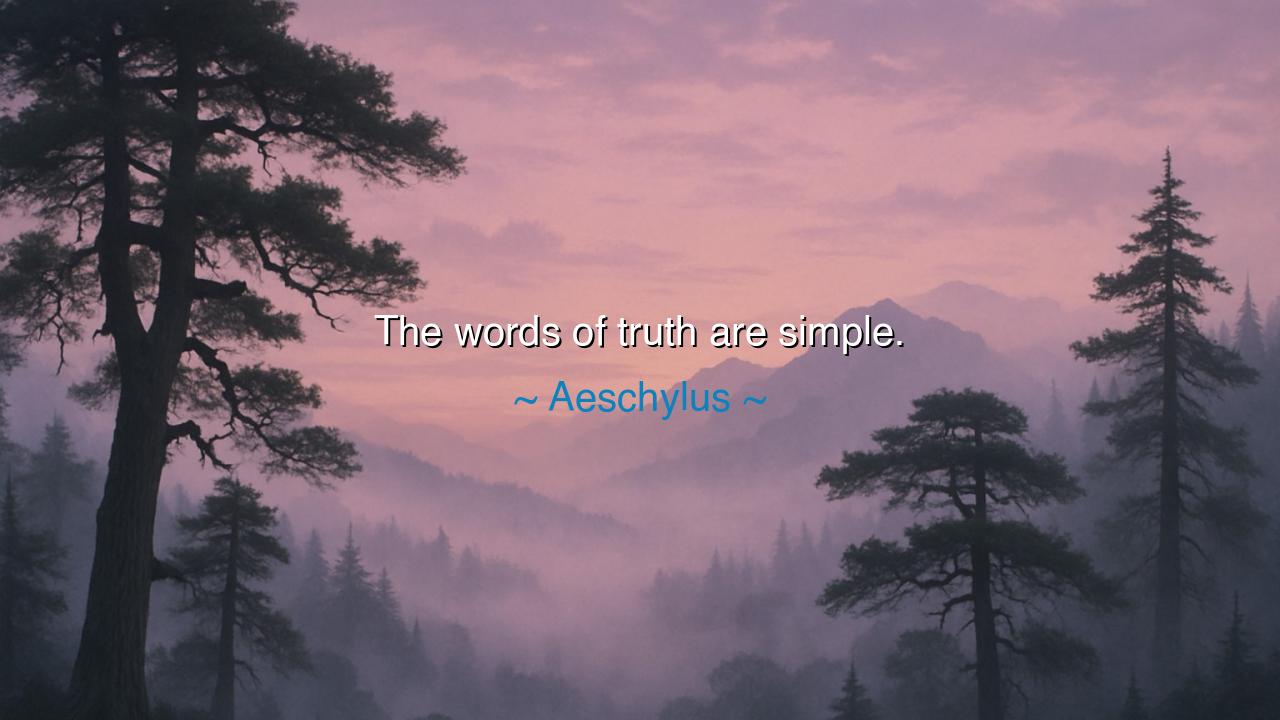
The words of truth are simple.






Hear the timeless words of Aeschylus, father of Greek tragedy and seer of human destiny: “The words of truth are simple.” In this short phrase lies the distillation of centuries of wisdom. For truth does not require ornament, it does not need tangled arguments or dazzling rhetoric. It shines with its own light, and its speech is clear, like a mountain spring. The more men strive to complicate their words, the more they reveal their distance from honesty. But when a soul has found truth, its language becomes direct, humble, and powerful.
The ancients knew this well. The oracle at Delphi carved into stone the words, Know thyself—three simple words, yet containing endless depth. Socrates, accused and standing before his accusers, declared only, “I know that I know nothing.” He did not cloak himself in lofty language or clever evasions. His words were plain, but because they were true, they resounded like thunder across the ages. So too Aeschylus teaches us: the words of truth are not embroidered with flourishes, but stand bare, like the pillars of a temple.
History offers us the example of Abraham Lincoln at Gettysburg. In only a few sentences, he consecrated the sacrifice of the fallen and called the nation to new birth. His speech was brief, his language plain, but his truth was eternal: that all men are created equal, and that a government of the people must not perish. Contrast this with speeches weighed down by pomp and flourish, long forgotten. The simple words of truth endure, because they strike the heart without obstruction.
We see this also in the lives of prophets and reformers. When Martin Luther King Jr. stood on the steps of the Lincoln Memorial, he did not weave a web of complex philosophy. He said with simplicity, “I have a dream.” Four words, yet they carried the truth of justice, the longing of a people, the cry of a generation. Simplicity did not weaken his message; it made it invincible. For the words of truth do not need complexity—they need only courage.
Why are the words of truth simple? Because truth itself is aligned with reality, and reality is direct. Lies are twisted, requiring disguise and defense, but truth needs no mask. Lies scatter like branches, but truth is the root. Lies multiply endlessly, but truth is singular, strong, and self-evident. When you find yourself tangled in explanations, it is often because you are straying from what is honest. To speak truly is to cut through confusion with the blade of clarity.
The lesson is clear: in your life, let your words be simple when they are true. Do not fear plainness; fear only deceit. Speak directly, whether in friendship, in work, or in moments of great trial. Seek not to impress, but to reveal. For the heart of man recognizes truth when it hears it, and simplicity is its mark. Cultivate this habit, and you will be trusted, honored, and remembered.
Therefore, let this wisdom be inscribed upon your heart: truth speaks simply, and simple words carry eternal weight. Guard your tongue from vanity and cunning. Choose clarity over ornament, honesty over display. For in the end, the world does not remember the long speeches full of flourish—it remembers the short, simple words that bore the power of truth. And if you live by this, your voice, too, will echo across generations, clear and undimmed.






HTHieu Thao
I love the idea that truth is simple, yet it can often feel so complex and difficult to grasp. Maybe we overthink things because we expect truth to come with layers of nuance or deep philosophical reasoning. But could the truth actually be something we’re all capable of understanding, if we just allow ourselves to see it for what it is, without overcomplicating it?
TTechnoblade
This makes me wonder—if truth is really simple, why does it often feel so elusive? Could it be that the truth is always simple, but our perceptions and emotions complicate things? When faced with a truth that is clear and simple, why do we sometimes resist it? Is it because we don’t want things to be so simple, or because we’re not ready to accept the truth as it is?
KItran khanh inh
Aeschylus’ quote makes me reflect on how often we try to mask the truth in elaborate language or justifications. The simplest truths are often the most powerful, but they can be hard to hear or face. Is it because we are afraid of the simplicity of truth, which might force us to take action? Or do we simply enjoy the comfort of complexity?
CDVINH CAM DO
This quote resonates with the idea that truth doesn't need to be wrapped up in fancy language or complex reasoning. Yet, we often seem to look for deeper meanings or explanations even when the truth is right in front of us. Why is it that we complicate things so much? Is there a reason we prefer complex answers, even when the truth could be simple and clear?
DNDoan Nguyen
I think Aeschylus has a point—truth tends to be straightforward when it’s expressed honestly. But why does it sometimes feel so difficult to accept or recognize the truth, even when it’s simple? Could it be that we overcomplicate things by adding layers of doubt, fear, or bias? Does the simplicity of truth get lost in our need to justify or explain it away?